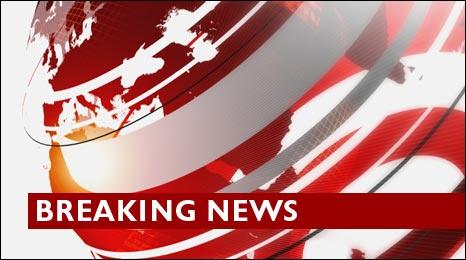Profile: Former Gambian President Yahya Jammeh
- Published
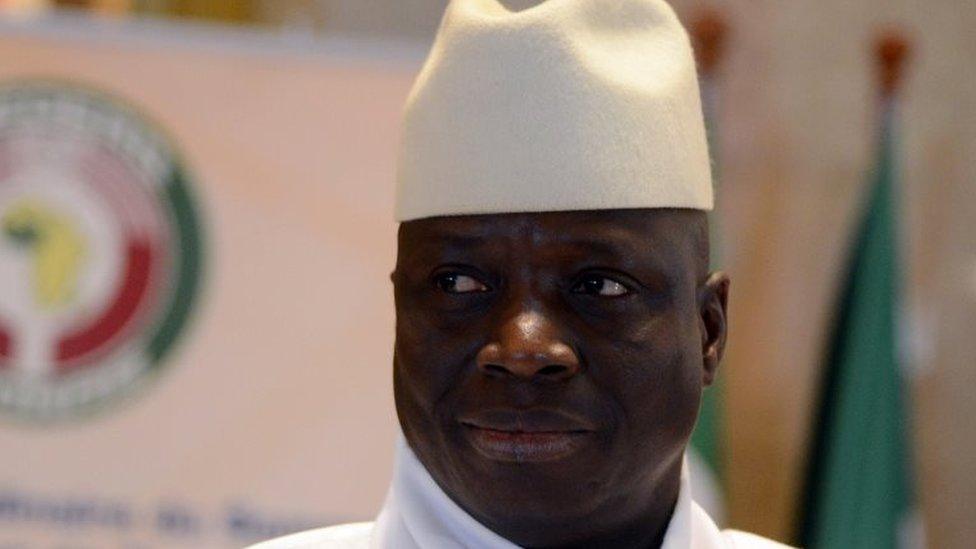
The 22 years in power of former Gambian President Yahya Jammeh came to an inglorious end.
Initially he surprised his critics by accepting defeat after 22 years in power, but then backtracked by announcing he would contest the result, only to backtrack again and leave the country.
Mr Jammeh departed on 21 January 2017 surrounded by cheering supporters and accompanying ceremonial music. He walked down a long red carpet surrounded by dignitaries before climbing the steps to the plane, waving to his admirers and saluting them with a Koran.
While soldiers, supporters and dignitaries despaired at his departure, many others in The Gambia are glad to see the end of what they considered a dictatorship, where there was little respect for human rights or freedom of speech
How he was persuaded to leave it not yet known. But the threat of military intervention from regional states was real enough.
He finally became the first president to peacefully hand over power in The Gambia since independence from Britain in 1965.
Portly president
Known for walking around with his trademark prayer beads and a stick, he was one of the world's most eccentric and ruthless leaders.
Born in May 1965, he came to power in 1994 as a 29-year-old army lieutenant in a country portrayed in tourist brochures as an idyllic holiday destination.
He became a portly president who portrayed himself as a devout Muslim with miraculous powers, such as the power to cure people of Aids and infertility. He also believed that homosexuality threatens human existence.
Mr Jammeh divorced his first wife Tuti Faal and subsequently married two other women, though his official website referred only to Zineb Yahya Jammeh, external, who held the title of First Lady.
According to The Gambia's privately owned Point newspaper, he married his second wife, Alima Sallah, in 2010, but Mr Jammeh's office issued an instruction that she should not be referred to as First Lady - in contrast to South Africa where all four wives of President Jacob Zuma hold the title.
"She is not to be addressed as the First Lady because, according to protocol, there can only be one First Lady and, in this case, that is Madam Zineb Yahya Jammeh," the newspaper quoted the presidency as saying at the time., external
Mr Jammeh won four multi-party elections before he was finally defeated.
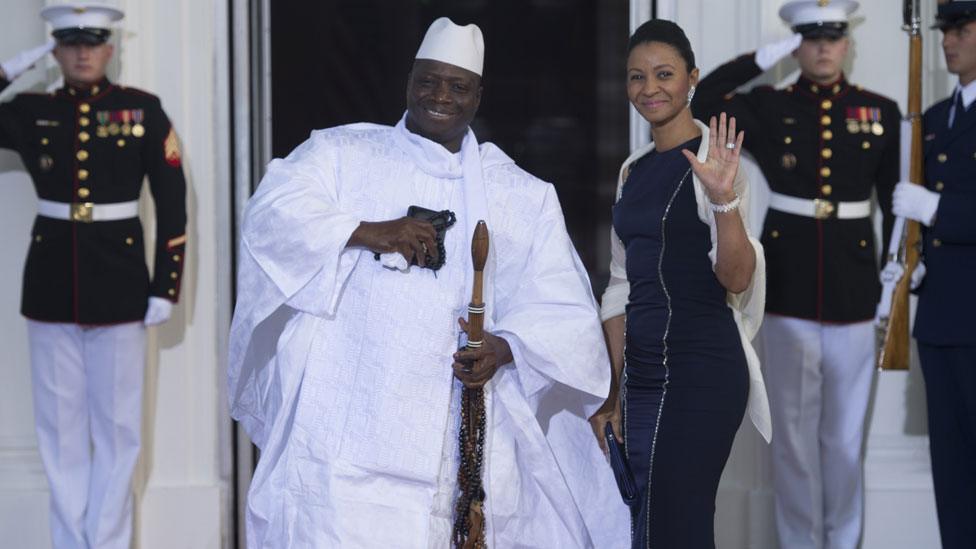
Zineb Yahya Jammeh, one of the president's two wives, officially holds the First Lady title
After his 2011 victory, in a sign that his credibility among African leaders had plummeted, the regional body, the Economic Community of West African States (Ecowas), refused to endorse his victory, saying voters and the opposition had been "cowed by repression and intimidation".
His decision to withdraw from the Commonwealth in 2013, which had been pushing for reforms in the tiny West African state, was a further sign of Mr Jammeh's growing isolation.
'Rule for a billion years'
In an interview in 2011 with the BBC's Focus on Africa radio programme, Mr Jammeh said he did not fear a fate similar to Libya's killed leader Muammar Gaddafi or Egypt's ousted President Hosni Mubarak.
"My fate is in the hands of almighty Allah," he told the BBC.
"I will deliver to the Gambian people and if I have to rule this country for one billion years, I will, if Allah says so."
Mr Jammeh said he was not bothered by the criticism of human rights groups.
"I will not bow down before anybody, except the almighty Allah and if they don't like that they can go to hell," he said.
'Executions'
Mr Jammeh was known for expressing bizarre views. In 2007, he claimed that he could cure Aids with a herbal concoction - a view condemned by health experts.
Later, he also claimed that he could cure infertility among women.
Mr Jammeh was also known for his virulent opposition to gay rights, having once threatened to behead gay people.
In a 2014 address to the UN General Assembly, Mr Jammeh lamented that Western governments were pushing for homosexuality to be legalised.
"Homosexuality in all its forms and manifestations which, though very evil, anti-human as well as anti-Allah, is being promoted as a human right by some powers," he said.
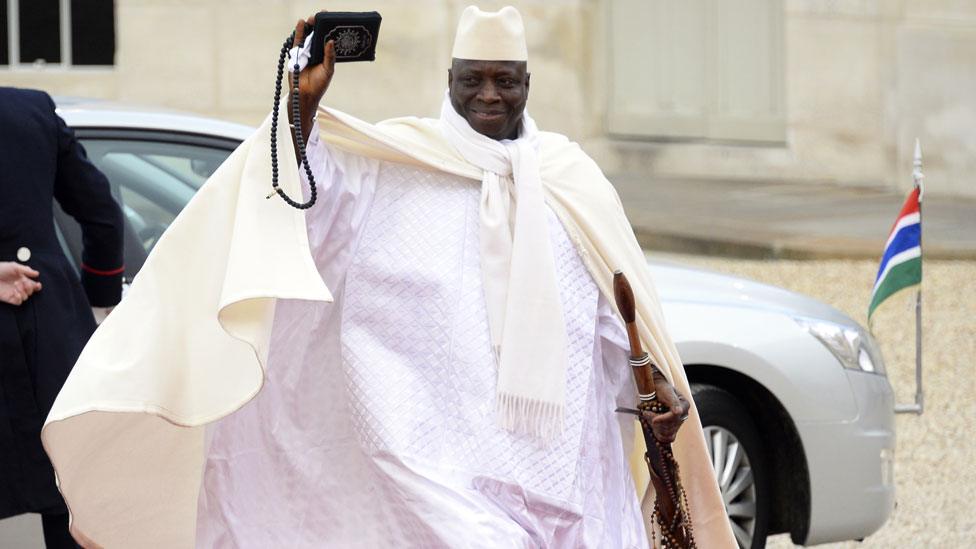
Yahya Jammeh is known for walking around with his trademark prayer beads and a stick
The Gambian government's treatment of journalists and opposition parties during his tenure in power also caused huge concern among human rights groups.
Mr Jammeh's government was under intense pressure to solve the murder of the editor of The Point newspaper, Deyda Hydara.
Gunned down in 2004, he has become a symbol of the campaign for press freedom in The Gambia.
The international media group Reporters Without Borders (RSF) said there was "absolute intolerance of any form of criticism" in The Gambia, with death threats, surveillance and arbitrary night-time arrests of journalists "who do not sing the government's praises".
In the BBC interview, Mr Jammeh denied his security agents had killed Mr Hydara.
"Other people have also died in this country. So why is Deyda Hydara so special?" he said.

Yahya Jammeh: At a glance
Born in May 1965
Seized power in a coup in 1994
In 2013, he vowed to stay in power for "a billion years" if God wills
He also ordered the execution of criminals and political opponents on death row
Claimed in 2007 he could cure Aids and infertility with herbal concoctions
Warned in 2008 that gay people would be beheaded
Denied his security agents killed journalist Deyda Hydara in 2004

In August 2013, Mr Jammeh used a speech to celebrate the Muslim festival of Eid to announce that all prisoners on death row would be executed, effectively ending a moratorium that had been in place for 27 years.
"There is no way my government will allow 99% of the population to be held to ransom by criminals," Mr Jammeh said at the time.
Nine people were executed, including Alieu Bah, a former lieutenant in the army who was arrested and jailed in 1997 for plotting to oust Mr Jammeh.
He agreed to halt further executions, following unprecedented pressure from the African Union (AU) and the European Union (EU).
His defeat came as a huge surprise, given that he ran one of the most feared intelligence agencies in Africa, with its tentacles spread across the country - so much so that until the election, people in cities and villages feared speaking ill of the man who was officially referred to as his "His Excellency Sheikh Professor Alhaji Doctor Yahya AJJ Jammeh Babili Mansa".
In 2015, he added the title "Babili Mansa" - a Mandinka-language honorific which can be translated as "chief bridge builder" or "conqueror of rivers".
- Published25 November 2011
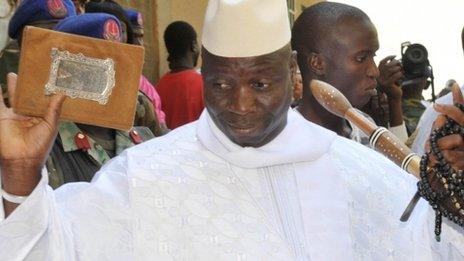
- Published12 April 2023
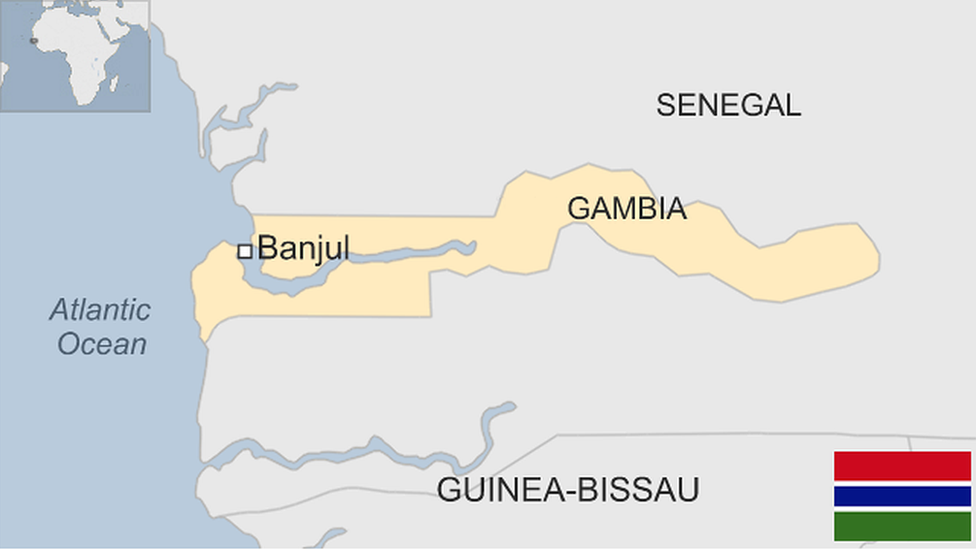
- Published7 September 2010
